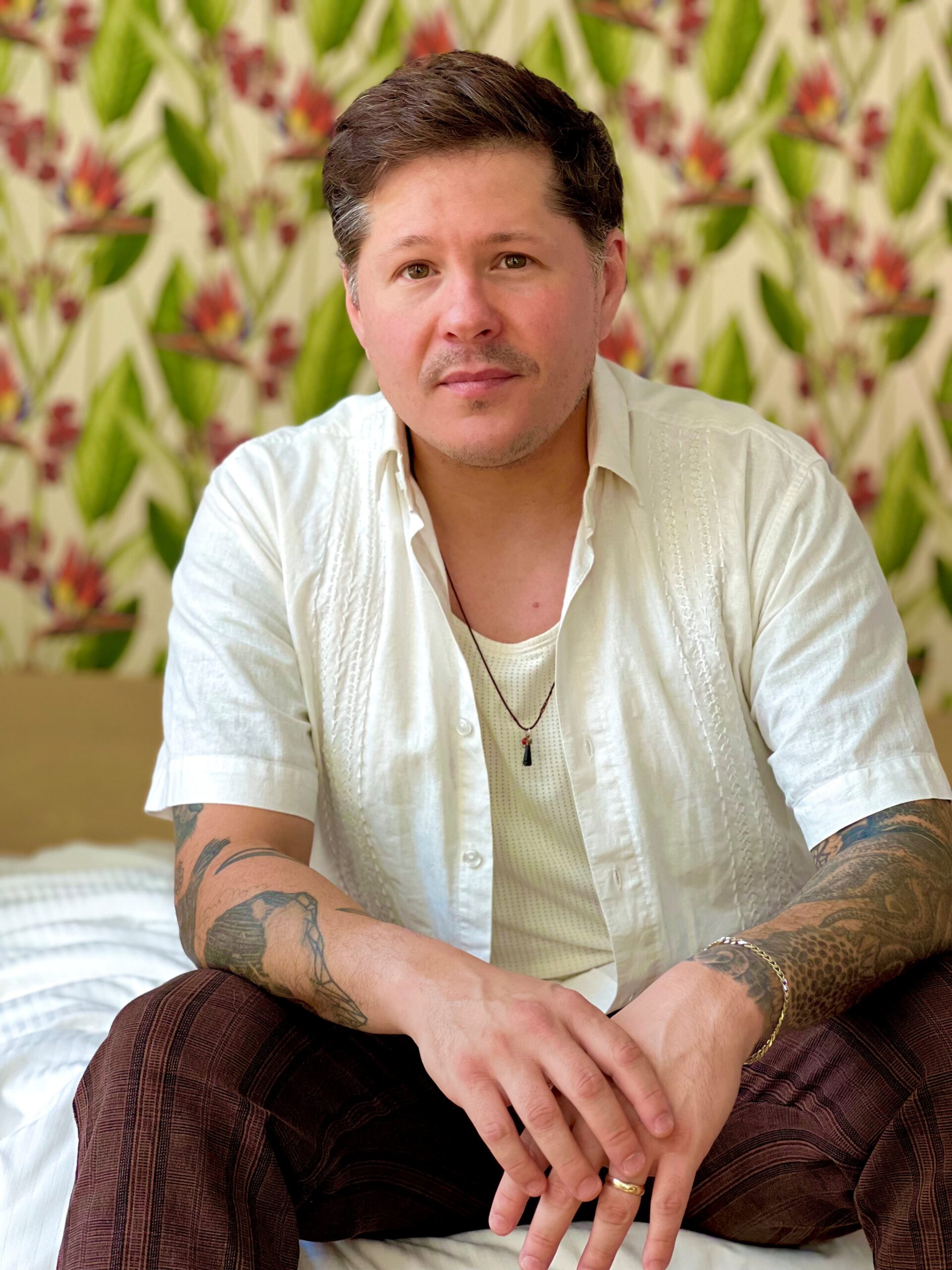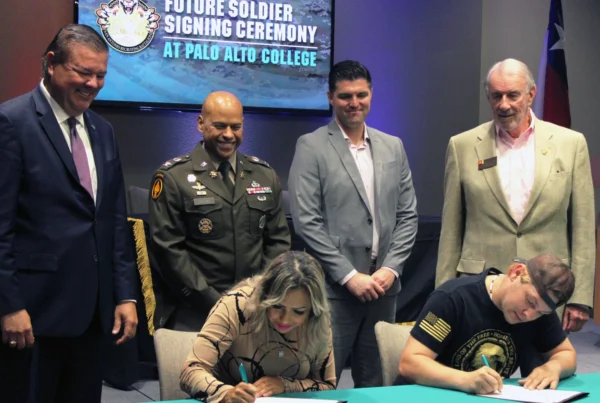From the bustling barrios of Caracas to lush jungles along the coast, Alejandro Puyana takes us on a decades-long saga of a Venezuelan family in his debut novel, “Freedom is a Feast.”
A native of Venezuela, now living in Austin, Puyana is also a graduate of the Michener Center for Writers at the University of Texas. He joined the Standard to discuss his new book. Listen to the interview above or read the transcript below.
This transcript has been edited lightly for clarity:
Texas Standard: Well, the novel begins during the failed military coup in 2002 against then-President Hugo Chávez. María, is a young mother living in Barrio Cotiza, whose life is dramatically affected by the event. Did you have an inspiration for her character? And why did you want to open the novel at this moment in Venezuela’s history?
Alejandra Puyana: Yeah, well, the moment in Venezuela history is huge. I mean, it changed the course of the country in many ways. It was the first time that Hugo Chávez had felt sort of under attack since he came in as president by a huge part of the population at that time.
Of course, Venezuelan politics was very different. There was huge support for the president. But it was a huge clash and it changed a lot of lives and it changed the political course of the country, because after that point, Chávez definitely turned into a more kind of authoritarian figure. The democracy that was there, that was quite different than what what was there before, shifted into a more sort of authoritarian side.

“Freedom is a Feast” author Alejandro Puyana. Photo by Emilia Galavis
The title of the book, “Freedom is a Feast” alludes to food being a central theme in the book. Can you say more about that and why that was a focus?
Yeah, yeah. Food is a huge part of the book. I mean, it’s a huge part of my life – so much so that my sister became a classically trained chef. Food was always around and was part of how our family came together. When I think about joyful, free moments of my life, it’s usually around food. And I wanted that to be part of the book.
So, the book, of course, deals with themes of freedom, both literal and non-literal. There are people in prison in the book that have to find their way out, but there’s a lot of talking about ideological freedom and what it means to be a free citizen in the book as well. And some moments in the book, tie food and freedom.
I think the name comes from a scene when one of my characters, Stanislavo, has just escaped military prison – has been captive for many months. And the poet who’s driving him to Caracas to a safe house offers him a bag of greasy fish empanadas, and he devours them and feels, for the first time in many months, free.
By telling the stories of your characters, you also provide a lot of political history of Venezuela. The character of Stanislavo was a member of the Revolutionary Left movement in the 1960s. Was this a history you were familiar with? Did you have to do a lot of research for the book?
Yeah, I definitely had to do a lot of research, but I was very familiar.
My dad was a young member of the Communist Party when he was young, when he was in his teenage years. And a good family friend, Teodoro Petkoff, who the book is dedicated to, was the inspiration for the character of Stanislav. As I grew up, I just heard all the stories about his exploits. He lived a mythical life full of prison escapes and amazing stories, and I was just steeped in that tradition.
So I knew a lot of it from stories that I had heard. But of course, I had to do a lot of research, read a lot of books, and watch a lot of documentaries. And yeah, all of that colored that portion of the book.
» RELATED: Contested Venezuela elections could have global implications
Well, the novel really shines a light on the resiliency of the citizens of Venezuela – particularly in your female characters. Could you say more about how you wanted to portray them?
Yeah. Venezuela, of course, has a very complicated history, especially in the last 50 or so years. And there’s people that live in many sides of the political spectrum. And I knew one of my main characters, Stanislavo occupied, at least later in his life, this kind of opposition side to Chávez and his government.
I knew that the other sides of the political spectrum had to be represented as well. And here María and her mother and Emiliana come in.
Emiliana I really think is the heart of the book. She has an affair with Stanislavo when they’re young and they’re in the mountains, as guerrilla fighters. And when Stanislavo splits – he starts to change his mind – and then Emiliana stays really involved in the activism of the time and remains, when Chávez comes to power, a strong supporter of his presidency.
I really wanted sort of a figure that occupied a different side than Stanislavo, and Emiliana really came out of the book to sort of occupy that space. And she, I think, sort of shows the resilience of those people that maybe occupy a different class in the Venezuelan system.
Well, María’s story includes that of her son, Eloy, as he grows from a child into a young man. What do the young people of Venezuela have to contend with growing up in the country today?
Yeah, well, obviously there’s been extreme poverty for a long time in Venezuela. This predates Chávez and his government, and then, of course, [current President Nicolás] Maduro and his government.
But certainly in the last 20 years, Venezuela has seen a steep decline in living conditions. Crime has soared, a lot of it because of necessity. I mean, people are so poor and food items and items of necessity are so hard to get a hold of that these circumstances have increased because of all those issues. And of course, we see now all of the forced migration from Venezuela that has made it all the way up to the U.S.-Mexico border.
And the youth are really struggling. I think part of why I wrote this book is I really wanted to tell the story of what happens to a young man that maybe has no other place to go. And Eloy is sort of the character that kind of takes us on that journey.
The Austin Chronicle recently published a profile of you, and in the article, you talk about a personal experience that made its way into your novel. Tell us a little bit more about that and how it shaped your writing process.
Yeah. This is also a tightly tied to the character of Eloy.
So, when my brother was in his early 20s, I was already living here in Austin. He was kidnaped in Venezuela. He was forced by gunpoint to enter the home of his friend. The criminals were trying to rob the house. And a pizza delivery person that was outside saw it all happening and went to the police and and brought the police over. And so it became a hostage situation for many hours.
Thankfully, my brother was okay. I talked to him later that night, he told me the story of what had happened, which, of course, was sad and horrible and frightening.
But as part of his story, he talked about how he and one of the kidnappers had sat down for a long time and had talked. The young man was extremely ashamed. He was apologetic to my brother. He told them that he had never done something like this before. That his friend had needed a car and he felt like he owed him a favor.
So that part of that story just stuck with me for a very long time. It felt like an encapsulation of what was going on in Venezuela. How, what we were talking about before, how people felt somewhat forced to turn to crime in order to survive. And it also felt like in different circumstances, me or my brother would have been in that same position, you know?
So that stayed with me for a long time. I didn’t write about it right away, but like a couple of years later, I wrote a scene of that kidnaping, I think, in order to process my feelings about it. But I did it from the point of view of the young kidnapper, of what I imagined this young man to be. And that was really the seed of the novel. That was the first scene I ever wrote on what would become this book.
» GET MORE NEWS FROM AROUND THE STATE: Sign up for Texas Standard’s weekly newsletters
Really fascinating to imagine that conversation. Has living in Texas given you a new perspective on your home country, or how has that come through in your writing?
100%. I mean, first of all, I think if I hadn’t moved to Austin, that I would be a writer today. I think I turned to writing very much because I wanted to process my feelings about my home country. To process my guilt for having left, and my family was still there, kind of fighting the good fight, and I was here in Austin, living my life.
And then the other thing about Austin that was amazing to me was that it gave me all the tools I needed to become a writer. I started taking an elective here at UT that kind of gave me the bug basically to write. And then I found a group of writers through the Hyde Park neighborhood listserv that nurtured me at that stage. And then I joined more structured workshops that were on offer from different institutions in Austin.
So really, Austin kind of guided my path as a writer from when I knew almost nothing about writing to when I was really prepared to sort of take a step into a more serious part of my journey, which was the Michener Center, which was just an amazing experience – three years of intense learning with some of the best writers in the country. Those three years changed my life and helped me finish this book. I mean, it helped me polish what I was thinking.
Well, what do you hope readers take away from this story?
I mean, I really want, especially readers that don’t know about Venezuela, to sort of try to see Venezuela as a complex, interesting place full of its own amazing culture, its own amazing background that kind of leads us to where we are now.
I mean, there are thousands and thousands of migrants right now, not only in the border here in Texas, but across the world that are trying to find a better place – better opportunities for them and their children. And they’ve gone through so much in the last few years.
And if anything, I would hope that this book shines a light on why they are here, on what has happened in our country and that they are amazing, resilient, beautiful people that we hope will go back home really soon. I mean, I truly believe that if things in Venezuela get better, so many of us are going to want to go back and return to our beautiful country.













